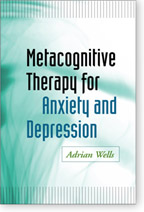 by Adrian Wells
by Adrian Wells
This groundbreaking book explains the "whats" and "how-tos" of metacognitive therapy (MCT), a cutting-edge form of cognitive-behavioral therapy with a growing empirical evidence base.
Full Description:
This groundbreaking book explains the "whats" and "how-tos" of metacognitive therapy (MCT), a cutting-edge form of cognitive-behavioral therapy with a growing empirical evidence base. MCT developer Adrian Wells shows that much psychological distress results from how a person responds to negative thoughts and beliefs-for example, by ruminating or worrying-rather than the content of those thoughts. He presents innovative, practical techniques and specific protocols for addressing metacognitive processes to effectively treat generalized anxiety disorder, obsessive-compulsive disorder, posttraumatic stress disorder, and major depression. Special features include reproducible treatment plans and assessment and case formulation tools, plus a wealth of illustrative case material. "The metacognitive model is based on years of research on the nature of different levels and processes of thinking underlying psychological disorders. Clinicians who read this revolutionary book will be able to utilize techniques found nowhere else. Intriguing, creative, and effective clinical strategies are illustrated with clear case examples that demonstrate how to modify recurrent patterns of rumination, worry, and over-reliance on problematic processes of thinking. Chapters on specific disorders provide tools and conceptualizations that take the cognitive model in new and exciting directions. I highly recommend this brilliant contribution."
-Robert L. Leahy, PhD, Department of Psychiatry, Weill Cornell Medical College, New York Presbyterian Hospital
"Metacognitive Therapy offers a strategy for addressing those well-learned and hard-to-fix thinking patterns that can be tough to change. As a clinician who has struggled with helping people work through dysfunctional thinking patterns, I can appreciate the usefulness of Wells's methods. Metacognitive therapy helps both the patient and the therapist take a step back from the sometimes repetitive work of cognitive therapy, and lends a new perspective with the potential for breaking through treatment roadblocks. Well done!"
-Monica Ramirez Basco, PhD, Department of Psychology, University of Texas at Arlington
310 Pages, Size: 6" x 9"
1. The Theory and Nature of Metacognitive Therapy
2. Assessment
3. Foundation Metacognitive Therapy Skills
4. Attention Training Techniques
5. Detached Mindfulness Techniques
6. Generalized Anxiety Disorder
7. Posttraumatic Stress Disorder
8. Obsessive-Compulsive Disorder
9. Major Depressive Disorder
10. The Evidence for Metacognitive Theory and Therapy
11. Concluding Thoughts
Appendices
1. Metacognitions Questionnaire 30 (MCQ-30)
2. Meta-worry Questionnaire (MWQ)
3. Thought-Fusion Instrument (TFI)
4. Attention Training Technique Summary Sheet
5. Self-Attention Rating Scale
6. CAS-1
7. Generalized Anxiety Disorder Scale-Revised (GADS-R)
8. Posttraumatic Stress Disorder Scale (PTSD-S)
9. Obsessive-Compulsive Disorder Scale (OCD-S)
10. Major Depressive Disorder Scale (MDD-S)
11. GAD Case Formulation Interview
12. PTSD Case Formulation Interview
13. OCD Case Formulation Interview
14. Depression Case Formulation Interview
15. GAD Treatment Plan
16. PTSD Treatment Plan
17. OCD Treatment Plan
18. Depression Treatment Plan
19. New Plan Summary Sheet
Stock: Usually ships in 3-8 business days!
|